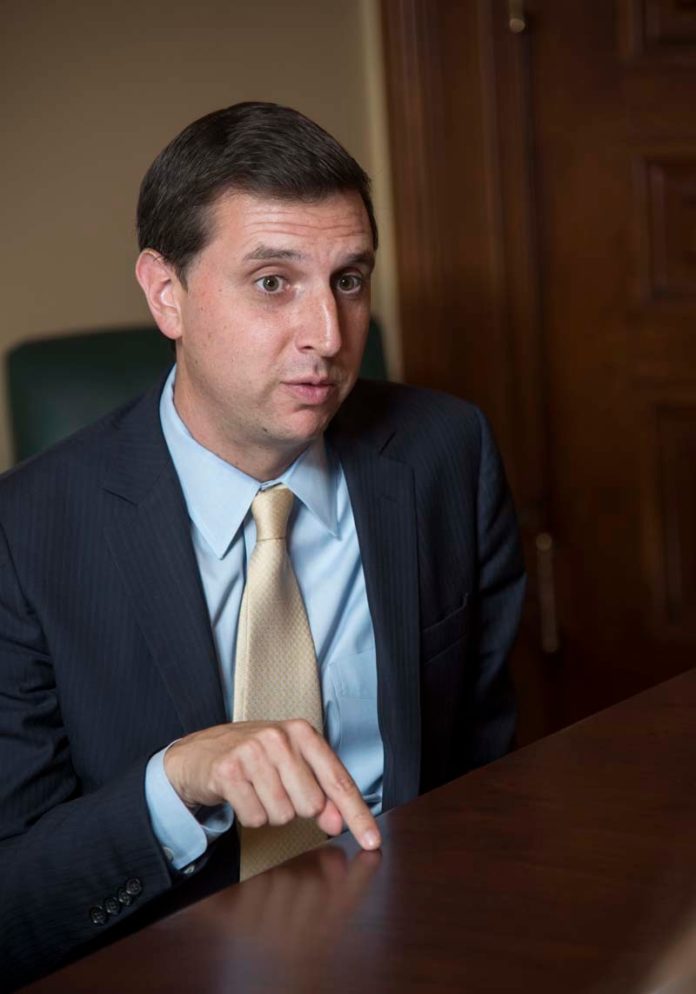
General Treasurer Seth Magaziner, who took office in January, oversees the Rhode Island public-employee pension plan, which is valued at nearly $8 billion. It is the primary retirement vehicle for 60,000 current and retired state employees, including teachers and police officers. He discusses his strategy for investing and the performance so far this year.
PBN: The rate of return for the pension fund is set at 7.5 percent. How did the pension fund perform against that last fiscal year?
MAGAZINER: We are long-term investors. We have a long-term time horizon. When we talk about the 7.5 percent target, that doesn’t mean we expect to hit 7.5 percent every single year. What it means is we strive to hit 7.5 percent a year on average over a long-term time horizon, typically we use a 30-year time horizon. Some years we’ll hit it, some years we won’t, depending on what happens with the market.
If you look at our performance over time, the fiscal year that ended June 30, we made about 2.2 percent. But if you take a step back and look longer term, our three-year average was about 9 percent. Our five-year average return was roughly 9 percent. And the 10-year was about 6 percent, but that includes the period when the market collapsed in 2008 and 2009. I encourage people to look at the long-time horizons when gauging our performance, because we are long-term investors.
PBN: Your internal benchmark for the year was 2.47 percent. You were a little shy of that, with a 2.2 percent return. What happened last year?
MAGAZINER: The biggest factor was weakness of international stocks, particularly European stocks, during the 2015 fiscal year. International stocks during that period were down by 5.2 percent. International stocks make up about 23 percent of our portfolio. We have a global allocation. Our stock allocation, across the U.S. and international, is meant to mirror the size of those countries’ stock markets proportionately.
PBN: Overall were you pleased with the return?
MAGAZINER: I think we can always do better. Since I took office in January, we’ve made over a dozen changes to the way the pension system is invested. Adding new managers who we’re excited about, dropping managers who we didn’t have conviction in. We’ve negotiated fees with several of our managers to get lower fee rates.
PBN: What triggers a change?
MAGAZINER: We have a talented investment team here in the office, led by our chief investment officer, Anne Marie Fink. They’re constantly monitoring our portfolio, to see how we’re doing. We also have two consultants to help us monitor the portfolio. We will generate ideas for how we can make improvements, internally, and then the consultants will also come to us with ideas.
PBN: So what were the reasons for some of the changes?
MAGAZINER: There was a fund we dropped a few months ago, it was called BlueCrest [Capital Management LLC]. That was a hedge fund that hadn’t been performing well. More important than it hadn’t been performing well, we didn’t have conviction it was going to improve in the future. We dropped them. Another change we made, if you look at the portion of our portfolio that is invested in stocks, we voted this summer to move one quarter of that from market-weight index funds to factor-weight index funds. You’re weighting companies not just on their size, but also on fundamental factors, the levels of debt that they have; their profitability. It doesn’t make sense to just be investing in larger companies because they’re large. Factor weighting is something other pension funds do but it’s a relatively newer way to invest.
PBN: Given the turbulence in the markets this past month, what has happened with the hedge funds and other alternative investments selected for the fund?
MAGAZINER: We’re still tabulating the August numbers. We’ll announce our August results at our September state investment committee meeting Sept. 22. Generally, in the month of August, the global stock market was down 7 percent.
PBN: Given your stance on the need for disclosure of fees by equity investments, have any of these investments been eliminated in the last few months?
MAGAZINER: In May, we announced a new policy, that going forward, we would only invest in managers if they let us publish their performance, all of their fees and expenses and their liquidity. That policy is in effect for all new managers. But for our existing managers, we’re in the process of going to them now and asking them to go along with that disclosure voluntarily. The public should know how these funds are performing, how much are they charging us and how quickly can we get out if we want to get out.
PBN: Have other state pension funds done something similar?
MAGAZINER: Several other states have called to ask about our policy and have indicated they might want to do something similar. We’ve also sent a letter to the [Securities and Exchange Commission], asking them to make it easier for pension funds to get key information from managers. Sometimes it’s difficult for us to even know how managers are calculating the bills they’re charging us. We organized this letter. But you shouldn’t have to do that. We are still waiting for a strong response from them, but we’re going to keep the pressure on. •












